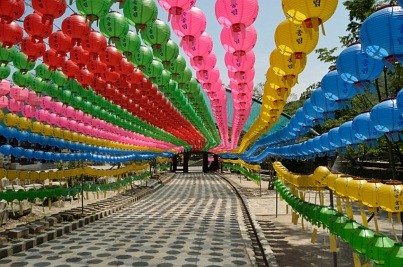 Busan is modern and despite its towering skyscrapers and legions of tourists, quite compact and easy to get around. The underground mass transit system covers every corner of the city and it runs like clockwork.
Busan is modern and despite its towering skyscrapers and legions of tourists, quite compact and easy to get around. The underground mass transit system covers every corner of the city and it runs like clockwork.English is widely spoken and visitors will find that there are few, if any, things in the Busan experience that cause disorientation or culture shock.
Beach wear is not welcomed away from the beaches themselves. By all means wear sarongs or tank tops on quick trips to boardwalk bars or shops, but in the downtown area, smart casual clothes are expected.
Tipping in bars and restaurants is not compulsory but it is becoming increasingly presumed as a standard way to complete a payment. Some basic Korean words will make all transactions friendlier, even if they can only be followed by gesturing or English speaking.
The South Korean won (KRW) is the currency of Busan, and paper currency comes in denominations of KRW50,000, 10,000, 5,000 and 1,000. Coins come in denominations of KRW500, 100, 50, 10, 5 and 1.
ATMs are located left, right and center and there are plenty of currency exchange offices at the downtown areas, the beaches and the airports. Credit cards are universally accepted but cash is the best option at the street and fish markets.
Busan's climate is pleasant and consistent. Subtropical, it has summer temperatures of around 30°C and winter averages of about 10°C. In other words, visitors can pack lightly at any time of the year as heavy winter coats are not necessary.
Rain falls heavily thought the mid-year wet season from June to September and this can be a fairly uncomfortable time to be in Busan since wet conditions are a daily occurrence. Visitors should pack umbrellas and raincoats if visiting at this time while plenty of tourists avoid the city during this period.
The Busan Subway is divided into three color-coded lines. On all pictograms and subway maps, the 1 line is red, the 2 line is green and the 3 line is brown. Announcements and signage are made in Korean and English. Automated ticket machines speed commuters through the process.
Taxis ply the entire city and beach area and in general, the city is too large to be explored comfortably on foot. The two main bus stations in Busan are Dongbu Intercity Bus Terminal, for routes east and north, and Seobu Intercity Bus Terminal, for routes west. There is also a busy port with connections as far afield as Japan.
Busan Gimhae Airport (PUS) is the city's international airport and it is located about 30 minutes' taxi ride from downtown Busan. Airport limousine buses and cheaper regular buses also ply the route to downtown every 20 minutes. The futuristic Busan Railway Station is the hub for rail travel between Busan and the rest of South Korea.
Population: 4,000,000
Spoken languages: Korean
Electrical: 220-240 Volts, 50 Hertz
Phone/calling code: +82 951
Find more information about Busan and hotels in the area:
Busan hotels | Korea hotels